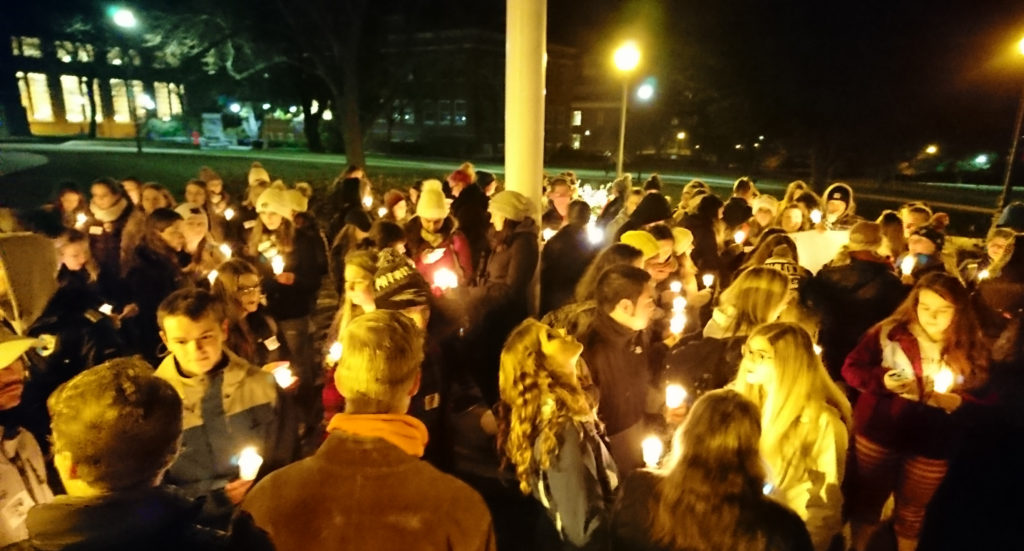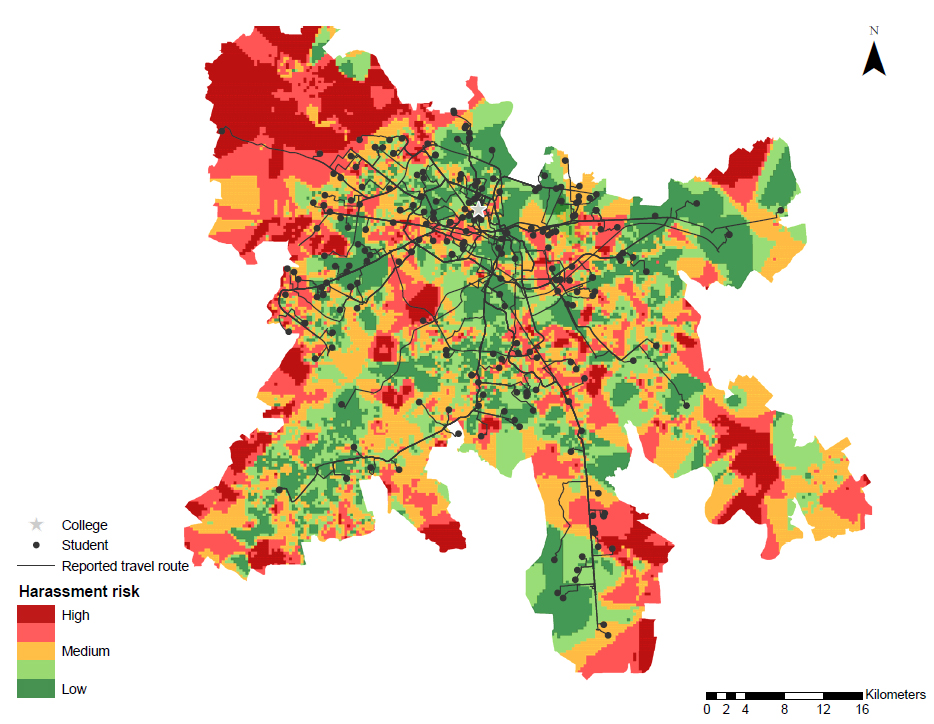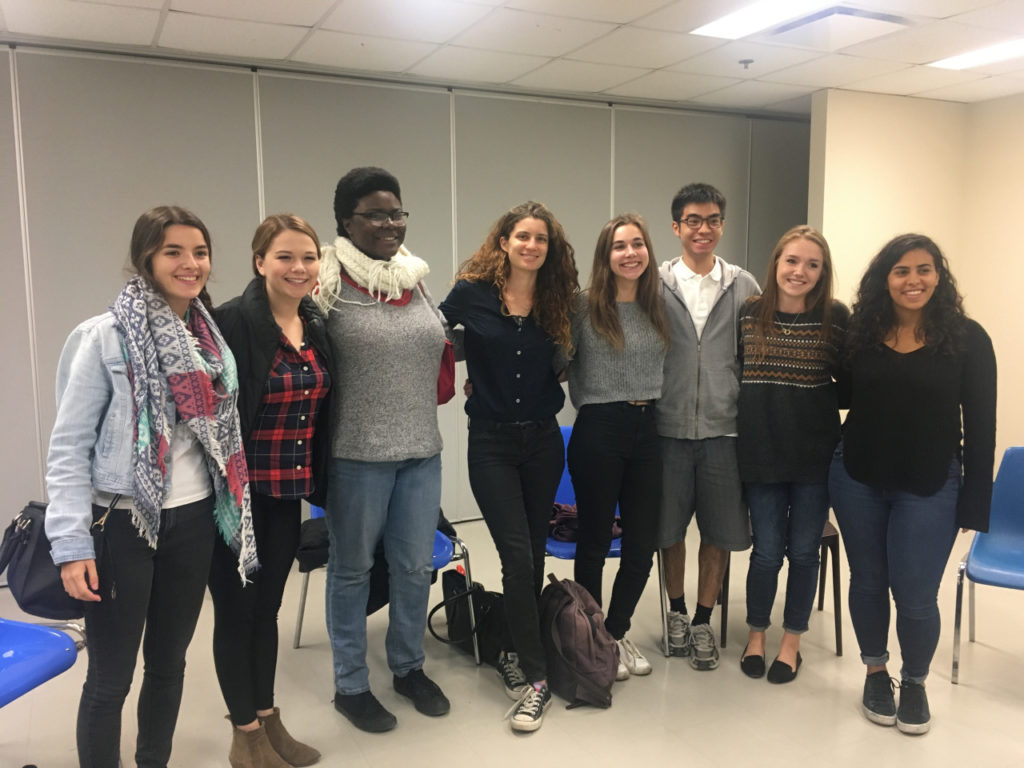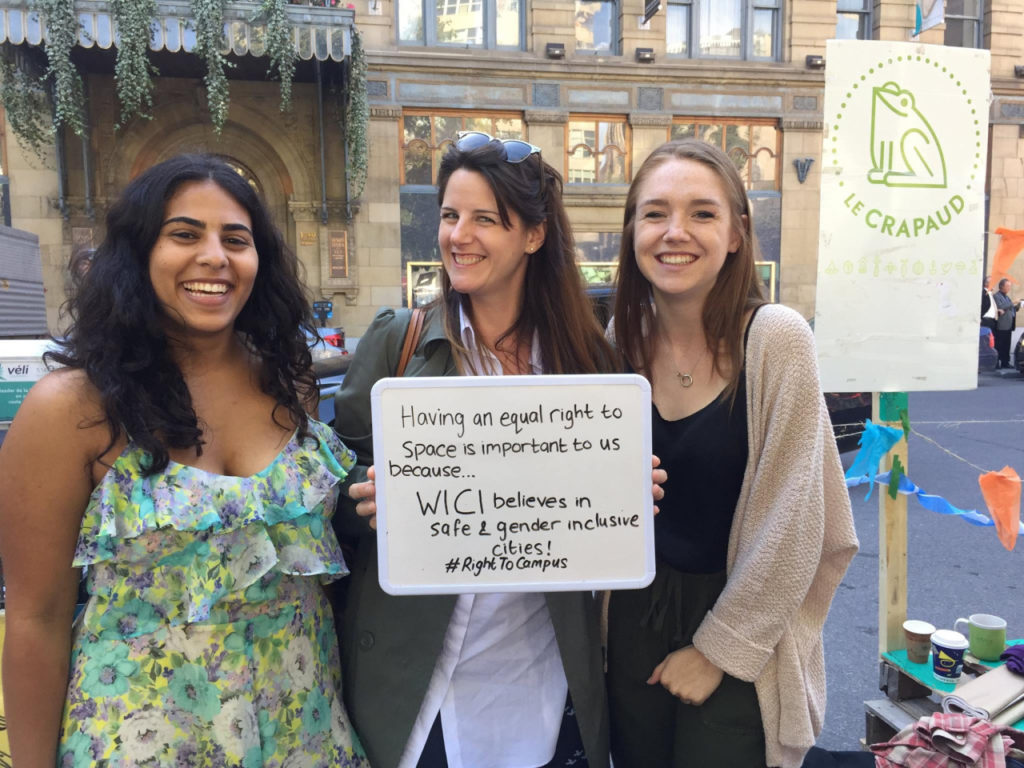Connie DiSanto, New Hampshire, USA, SSH Blog Correspondent

Take Back the Night (TBTN) events have been held worldwide since the 1970s as a way for women to “take back” their right to walk safely at night, within their own communities. Earlier event participants were exclusively women but today, many include men as allies and survivors. Here at the University of New Hampshire, TBTN events date back to the 1990s and our program, the Sexual Harassment & Rape Prevention (SHARPP) has, in various forms, sponsored and participated in TBTN events. This past fall was no exception.
Led by a handful of dedicated SHARPP peer advocates, some of whom are affiliated with sororities and fraternities on campus, a couple hundred students and a few staff members gathered to say that all forms of sexual violence and harassment and rape culture do not have a place on our campus. The group marched in solidarity in the dark and cold with hand-made signs with messages of strength and support for a safer campus. And at the end, the vigil brought forth brave survivors who spoke to the group.
We were proud of the student turnout and even happier that several fraternities had come out in support. However, our celebration of a successful event was cut short when a female student reached out and reported to our office that a group of male students from a particular fraternity was in fact, the opposite of what they presented themselves to be. Not in support. Not allies. Not true to the spirit of the event and all it stands for. Despite an initial plea from our student event leader who specifically asked the group to be respectful while participating in this event, these men mocked the true participants’ chants by shouting, “Assault is hot, consent is not” and engaged in sexually harassing comments to female students.
Reports were made about the incident to the Greek Life administration, the Dean of Students, and the Title IX office, resulting in disciplinary actions by Greek Life. University disciplinary action has not been communicated to our office to date. The students that came forward to report what had happened did everything they could in the moment. They confronted the individuals, pointing out that their behavior was unacceptable. It even prompted a male student among them to say, “You might want to watch what you say.” We applaud the students for coming forward to report the behavior at this event, knowing that they might be putting themselves in a vulnerable situation. Campuses need safe spaces for students to come forward and they need staff to support them and speak on their behalf.
As we de-briefed as a staff, we recognized this incident was not unique in itself since we’ve experienced similar behaviors among students through the years, but in this case, the brazen action taken by those students who were presenting themselves as “participants” was more than troubling. In a time when sexual violence and harassment on campus, and in all areas of society, is finally able to ‘come out of the dark’ and be discussed for what it is, an epidemic, we have to continue call out those individuals who feel they can walk among us, and make us feel unsafe and threatened.
#Metoo and The Silence Breakers have done more than reveal we are not alone as those impacted by sexual violence and harassment. It has given many people a voice and an opportunity to call out those individuals who assault and harass and make sure they know we see them for what they are. And as the new #TimesUp movement’s mission states: “No more silence. No more waiting. No more tolerance for discrimination, harassment or abuse.” The call for action is now.
Connie is the Marketing Communications Specialist for the Sexual Harassment & Rape Prevention Program (SHARPP) at the University of New Hampshire. She can be reached at connie.disanto@unh.edu.





 For their next project, the Right to Campus team is planning an art show in spring next year. “We want to ask people what right to space means to them. It can be any personal interpretation of space”, says Dina, “how they feel in space, how they navigate that space.” In the long run, Dina and Arianna are hoping to expand Right to Campus from McGill University and implement the campaign on university campuses worldwide: “We want to take the
For their next project, the Right to Campus team is planning an art show in spring next year. “We want to ask people what right to space means to them. It can be any personal interpretation of space”, says Dina, “how they feel in space, how they navigate that space.” In the long run, Dina and Arianna are hoping to expand Right to Campus from McGill University and implement the campaign on university campuses worldwide: “We want to take the  Today marks the start of Freshers’ Week here in the UK. Over 400,000 undergraduates begin their first week of their first term of their first year at university. A longstanding institution, ‘Freshers’ Week’ – or ‘Welcome Week’, to give it it’s formal name – is fun, flirty and fabulous. A lot of planning goes into making it so and this year, more so than any other, a lot of effort has also gone into ensuring students’ sexual safety.
Today marks the start of Freshers’ Week here in the UK. Over 400,000 undergraduates begin their first week of their first term of their first year at university. A longstanding institution, ‘Freshers’ Week’ – or ‘Welcome Week’, to give it it’s formal name – is fun, flirty and fabulous. A lot of planning goes into making it so and this year, more so than any other, a lot of effort has also gone into ensuring students’ sexual safety.